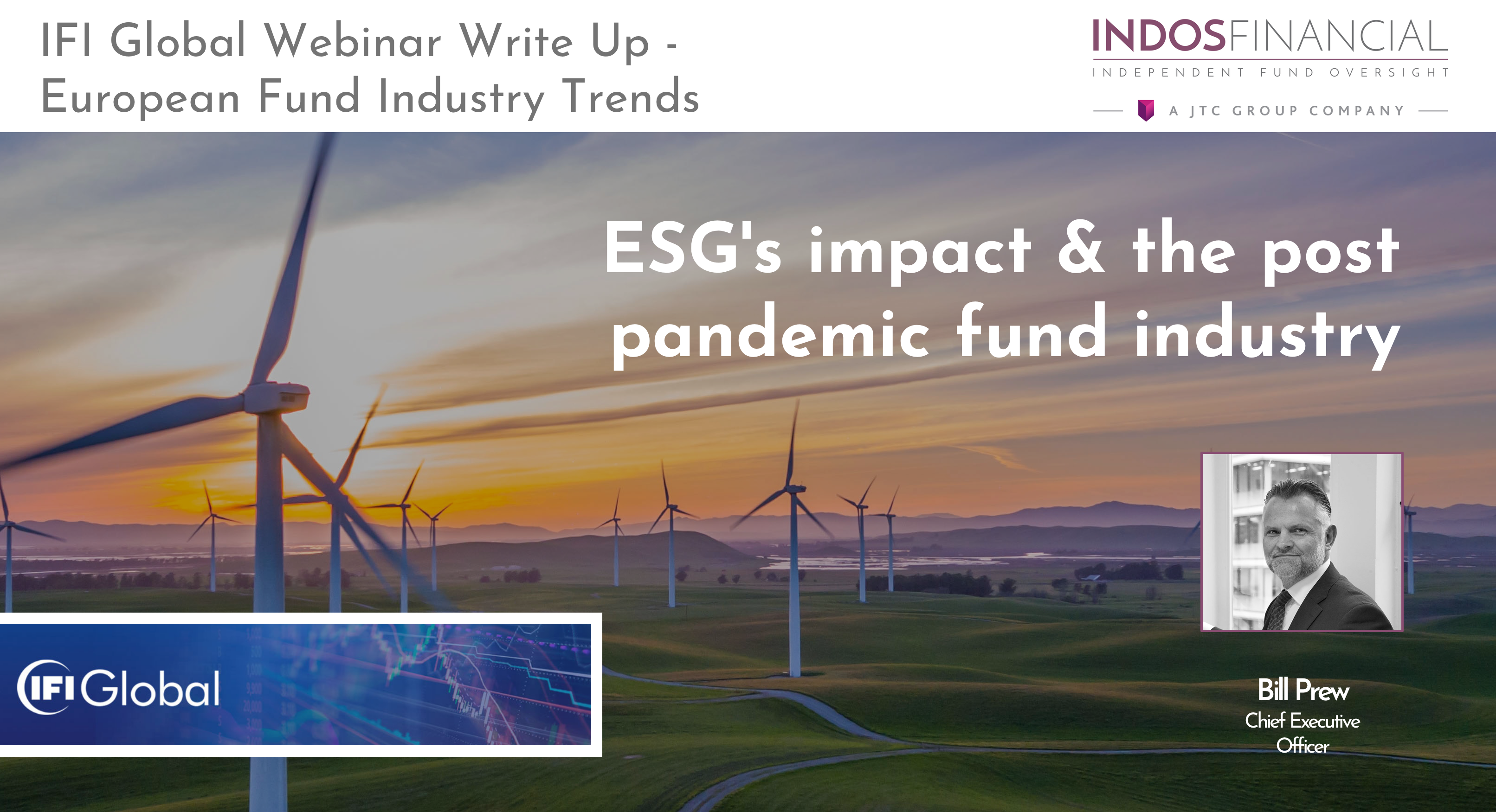Bill Prew, CEO of INDOS Financial, a JTC Group company which provides depositary and specialist oversight services for investment funds, participated in an IFI Global webinar, where he shared his insights on how ESG [environmental, social, governance] is being incorporated into asset management.
The focus on ESG only grows
After a fifth successive quarter of AUM [assets under management] growth, sustainable funds now control around $2.3 trillion, according to the latest Morningstar data. [1] “A number of asset managers sense that there are excellent opportunities to be realised through ESG investing, which is why so many of them are incorporating it into their decision-making processes,” notes Prew. This jump in ESG funds’ AUM is being driven by increasing investor interest in sustainability and climate change. Data from Natixis shows that the percentage of institutions implementing ESG rose by 18% between 2019 and 2020 to 72%.[2] For many retail and institutional allocators, ESG investing offers them the opportunity to obtain both superior and socially responsible returns – relative to traditional investing.
Regulation is also accelerating ESG investing globally. The EU – for example – introduced the Sustainable Finance Disclosure Regulation [SDFR] in March 2021 while its Taxonomy – a benchmark categorising sustainable economic activities – will shortly follow. Although the UK has decided not to implement the EU’s SFDR as part of its Green Finance Strategy, it is imposing new climate reporting requirements on asset managers[3], insofar as they will be expected to publicly disclose climate change metrics in a template modelled on the Financial Stability Board’s [FSB] Taskforce for Climate-related Financial Disclosures [TCFD]. The US – which was once hostile to the notion of ESG reporting and investing – could eventually implement its own ESG reporting rules on asset managers following the recent leadership changes. As regulators and investors take ESG increasingly seriously, fund managers are following suit.
A shifting way of working
Although asset managers are repositioning their portfolios by concentrating more heavily on ESG investing, a majority of financial services firms told an IFI Global that they do not consider their businesses to be carbon neutral. The study found just 7% of respondents were carbon neutral. Prew expressed his surprise at the findings, although adds the process of becoming carbon neutral is perceived by many as being more complicated than what it actually is and expects more firms to undertake the exercise in due course. He continues that some forward-thinking investment firms are also analysing the carbon footprints in their own supply chains – including service providers. “We are starting to see some managers consider the ESG characteristics of their service providers,” comments Prew.
It is also widely expected that international travel – an activity synonymous with asset management [and the financial services industry more generally] will reduce as a result of the growing concerns about climate change and as a lasting consequence of the Covid-19 pandemic. The IFI Global study revealed that 77% of respondents said there would be reduced air travel in the funds industry, especially in light of the IPCC’s [Intergovernmental Panel on Climate Change] Climate Change Report, which was published in August. Prew believes that although the structure of the funds industry itself is unlikely to change, video conferencing calls will continue to replace a number of physical meetings that previously would have required international travel. “Working practices have evolved dramatically – through the adoption of digitalisation – over the last 18 months owing to the pandemic, and the industry has continued without much disruption,” he says.
A gradual ESG learning curve
ESG investing is still in its early stages of development in terms of adoption across the asset management world. “In the next three to five years, the industry is going to become a lot more knowledgeable about ESG. Understanding issues like ESG will take time, but I do believe it will become a mainstream component of asset management,” says Prew.
[1] Reuters [July 27, 2021] Global sustainable fund assets hit record $2.3 trillion in Q2, says Morningstar
[2] Natixis – 2021 ESG Investor Insight Report
[3] 3 FCA CP21/17 [June 2021] Enhance climate-related disclosures by asset managers, life insurers, and FCA-regulated pension providers




